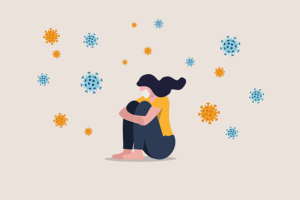For nearly half a century, NAMI advocates have fought for every person to have access to the mental health care they need when and where they need it. While we’ve come a long way, we unfortunately still live far from that reality. For many, new barriers are making it even harder to get the care they need. In particular, people who identify as LGBTQ+ face many additional challenges in accessing mental health care, and many ongoing societal and social factors are contributing to worsening mental health and suicidality within the LGBTQ+ community.
The Current Landscape
In the last two years, state legislatures have proposed a record amount of legislation to limit LGBTQ+ rights — with many passing into law. These new laws will result in a tidal wave of concerning mental health effects for LGBTQ+ individuals, especially youth, who are the focus of many of these policies. In particular, legislation has targeted individuals who are transgender and nonbinary. Many recent state policy proposals seek to limit, block or even criminalize access to gender-affirming care.
Gender-affirming care is often misunderstood. It includes a range of social, psychological and medical services that support a person’s gender identity when their identity does not align with the sex they were assigned at birth. Studies consistently show that adults’ access to gender-affirming care, such as gender-affirming surgeries and gender-affirming hormone therapy, can improve mental health. Similarly, denying gender-affirming care can worsen mental health symptoms and increase suicide risk.
Many people assume that gender affirming care means surgical interventions, but for youth, that’s generally not the case. Surgery is typically not provided until adulthood. Affirming care for transgender and nonbinary youth begins with social interventions (e.g., changing name, clothing, pronouns, etc.) before puberty blockers and hormone therapy are considered, and working with a mental health professional is usually a critical part of this care. Transgender and nonbinary youth receiving gender-affirming care have improvement in symptoms of depression and suicidality. And those who don’t receive gender affirming care experience an increase in mental health symptoms.
Lesbian, gay and bisexual adults are more than twice as likely as their peers to experience a mental health condition, jumping to four times as likely for transgender adults. These statistics represent real people, but tragically, despite a need for care and support, people within the LGBTQ+ community too often experience discrimination in health care settings. Because of stigma, the lack of diverse mental health providers (sometimes, the lack of any mental health providers), and many new policies that make it more difficult for individuals to live authentically, people who identify as LGBTQ+ often struggle with their mental health without getting culturally appropriate and sensitive care.
And when we don’t provide help, we lose lives. As advocates for mental health, it is important that we use our voice to stop harmful practices that worsen mental health.
We Must Do More To Help LGBTQ+ Youth
Rather than making decisions based on evidence and clinical guidance, too many kids and their families are afraid to seek out the care that will support positive mental health outcomes. In some cases, these proposals make it illegal to provide this care or seek it out for your child. The message these laws send our kids is that something is wrong with them — and that message is incredibly, irreversibly harmful.
We must do more to help our kids. Recent data from The Trevor Project, released in May 2023, found that more than 2 in 5 (41%) LGBTQ young people seriously considered attempting suicide in the past year — with rates for young people who are transgender, nonbinary and/or people of color higher than for their peers. Tragically, 14% of LGBTQ young people attempted suicide in the past year, including nearly 1 in 5 transgender and nonbinary young people.
As mental health advocates, we fight to improve lives and end stigma and discrimination. As allies, our voices are critical to providing support and acceptance to fulfill NAMI’s vision that every person affected by mental illness deserves to be treated with dignity and respect and surrounded by a community that cares.
For a person — especially a young person — who is transgender or nonbinary, that allyship and support are desperately needed right now. As laws pass that limit, ban or criminalize the ability to get clinically appropriate care, too many children are forced to live inauthentically. We know the tragic mental health impact of that. We can’t sacrifice our kids’ futures.
How You Can Help
- Educate yourself. Learn more about LGBTQ+ discrimination and inequities and the impact of limits on gender-affirming care so you can be knowledgeable on these issues.
- Speak up. Be an ally and educate your friends, family and policymakers on this issue and the mental health impact of these limits and bans. All our voices are needed.
- Reach out and check in. Support the people in your community and check in on them.
- Seek out support and/or share resources. The 988 Suicide & Crisis Lifeline is a resource for anyone in a mental health, substance use or suicide crisis, and it now offers specialized services for LGBTQ+ callers. Reach the Lifeline by calling or texting “988” or chatting online at 988Lifeline.org. You can also seek support from The Trevor Project.
As NAMI CEO Daniel H. Gillison, Jr. said in 2022, “To LGBTQ+ youth and adults across the country during this challenging and overwhelming time, please always know that NAMI is here to support you. You are seen. You are loved. You are not alone.”
Hannah Wesolowski is the Chief Advocacy Officer at NAMI.




